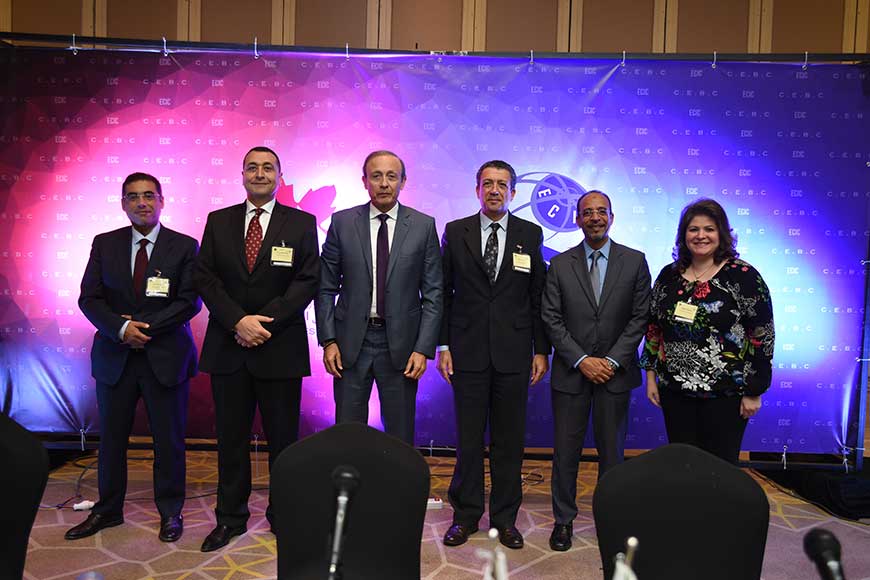
Date
Speaker(s)
Mr.Amr Aboueish
Ms.Reham Farouk
Ms.Mona Zulficar
Ms.Hanaa El Helaly
Mr.Magdy Moussa
Description
“Microfinance… A Pivotal tool in Poverty Alleviation, An Integrated Approach”
The Egyptian government is exerting efforts to promote and develop the small enterprises sector in a way to fight poverty, reduce unemployment rates and expand its participation in supporting the national economy. Several initiatives have been launched to provide financing for micro projects in cooperation with banks and NGOs, but despite all these efforts, this sector is still facing many difficulties, especially in accessing the source of fund.
In this context Canada Egypt Business Council and The Egyptian Council for International Cooperation have organized an event with Ms. Reham Farouk CEO – Al Tadamun Microfinance, Mr. Amr Abou Elazm Chairman- Tamweely Microfinance, Mr. Amr Aboueish Chairman, CEO and Founder – Tanmeyah Microfinance Services, Ms. Mona Zulficar Chairperson Egyptian Microfinance Federation and Ms. Hanaa El Helaly Executive Consultant for Institutional Relations –EALB.
In the opening remarks Eng. Motaz Raslan welcomed all members and guests then he mentioned that the small medium enterprises is one of the most important sectors which must get enough attention in order to grow, this sector is no longer an option for the government, but rather an imperative for advancing the economy and achieving sustainable development. According to the world’s economic map, most of the emerging economies had adopted on this sector, such as Singapore, Japan, China, Malaysia and many more. It was explained that this sector has become the nerve of the economy and a major axis of growth in the developed and emerging countries of the world. The SMEs sector represents more than 90% of the total projects in the majority of the economies of the world and they also provide between 40% and 80% of the total job opportunities, representing more than 85% of the GDP of many countries.
It was explained that there are about 2.4 million small and micro enterprises that can lead the economy to a higher level than it is now, especially for its great role in providing jobs, reducing unemployment rates, and most importantly supporting the economy and advancing development. It was pointed out that the government has recently alerted to the importance of this sector, and launched several initiatives and programs, foremost, the establishment of a microenterprise development agency, which provide training programs to support entrepreneurship.
Mr. Gamal Khalifa confirmed that the microfinance activity started in Egypt through NGOs until the law governing microfinance was issued in 2014 and the supervision was given to the Financial Supervisory Authority. He added that the law sets the special rules for licensing companies and associations to practice microfinance activity, which works separately under the supervision of the Financial Supervisory Authority, pointing out that just in 3 years the number of associations operating in financing activity became 870 NGOs and 3 companies. He pointed out that the volume of financing for microenterprise activity reached about 7 billion pounds by the end of 2017, for about 2 million Egyptian citizens, and also the banks became interested in financing this sector, because it has become regulated and its financial statements and indicators are positive.
Ms. Reham Farouk stressed on the interest of the Foundation in financing women’s projects to raise their standard of living. She explained that microfinance is the sole activity of the institution; in particular, funding is directed to women. She added that when the standard of living of women is raised, this has a large return on her family and that the foundation focuses on financing women to improve their standard of living by increasing their income. She pointed out that the Foundation funded about 140 thousand Egyptian women in 7 governorates across 42 branches, stressing that their target is to fund 200 thousand projects for women by 2020
Mr. Magdy Mousa said that the association is lending about 200 million pounds per month to 41,000 micro projects and that the size of the portfolio in the association is LE 1.2 billion. He explained that there are about 420 thousand active customers, including 41% of women. He added that the interest of the Association is to address the sectors of added value to the Egyptian economy, which helps in creating sustainable employment opportunities and that the number of active customers in the sector in 2016 was 1.8 million, with a total financing of 4.4 billion pounds, and that in 2017 the number of customers increased to 2.3 million active customers with a total financing of about 7.1 million pounds.
Mr. Abu Al Azm, said that job creation leads to reducing poverty rates and severity. It was shown that financial services for microenterprises, including insurance, lending and savings, were available to reduce poverty. He added that the availability of financing for micro-projects means enabling the citizens to grow, pointing out that the central bank aims to reach the proportion of funding for micro-projects to 20% of the total portfolio of banks. In 2000, a study on financing in Egypt found that 94% of the total funding from the project banking sector goes to only 2% of the private sector, which is the largest companies. Therefore, there was a distortion in the funding structure and an unfair distribution of state resources of Finance.
Mr. Amr Abush said that the access to microfinance is the right of every citizen, and that the government must ensure that every citizen received that right, and funding societies should disseminate cultural thought among the people to raise awareness of their rights.
The floor was opened for questions and answers session.














